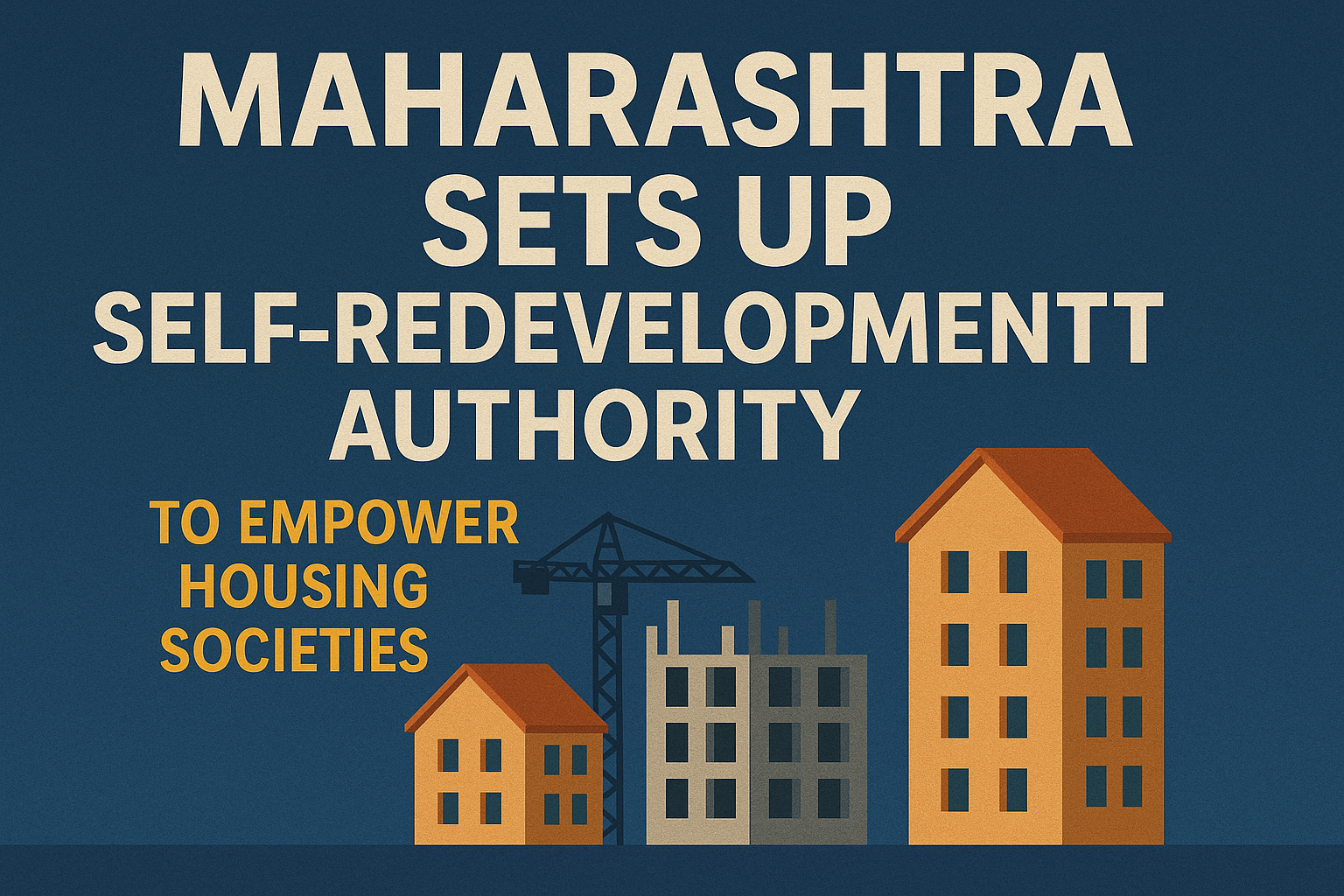
Maharashtra Sets Up Self-Redevelopment Authority to Empower Housing Societies
In a move aimed at transforming the urban housing landscape, the Maharashtra government has constituted a Self-Redevelopment Authority to support housing societies in independently redeveloping their old buildings. The initiative is expected to provide a major push to the self-redevelopment model in Mumbai and the larger Mumbai Metropolitan Region (MMR), where thousands of aging buildings are awaiting renewal.
A Landmark Decision
The order, issued on Monday, marks a significant follow-up to the state’s New Housing Policy approved earlier this year. The policy had already earmarked ₹2,000 crore for self-redevelopment projects and envisioned the creation of a dedicated support cell. With the new Authority now in place, societies will be able to access institutional assistance in planning, funding, developer selection, and project execution, allowing them to take control of their own redevelopment journey.
A senior housing department official said, “The authority will provide end-to-end support, empowering societies to undertake redevelopment independently instead of depending on external builders.”
Leadership Under Pravin Darekar
BJP legislator Pravin Darekar, who also chairs the Mumbai District Central Cooperative Bank, has been appointed as the president of the Authority and accorded ministerial status. Darekar has long advocated for self-redevelopment through cooperative banks and recently headed a state-appointed study group on the subject.
The study group’s recommendations included offering an additional 10% carpet area to housing societies, lowering the minimum plot size requirement for cluster redevelopment from 4,000 to 2,000 square metres, and expanding the scope of the scheme to encourage collective redevelopment. Darekar submitted this report to Chief Minister Devendra Fadnavis in July, laying much of the groundwork for the present decision.
Scale of Opportunity
According to estimates from real estate body CREDAI-MCHI, more than 25,000 buildings across MMR are eligible for redevelopment, representing a project value exceeding ₹30,000 crore. For decades, many of these structures have remained in limbo due to stalled projects, disputes with developers, or a lack of financial support. By enabling societies to undertake redevelopment on their own, the new Authority seeks to unlock this massive potential while safeguarding residents’ interests.
Chief Minister Fadnavis has already extended significant policy incentives to support this model. In February, he announced a waiver on interest for premiums on self-redevelopment projects until March 2026. In May, he promised subsidised loans for housing societies, while also seeking the involvement of the National Cooperative Development Corporation (NCDC) to channel institutional finance into the sector.
Expected Benefits
Self-redevelopment offers multiple advantages to housing societies. Unlike builder-led projects, residents retain control over timelines, design choices, and the allocation of space. They also stand to gain larger homes, as developers’ profit margins are not a factor. By introducing a dedicated Authority, the state aims to streamline the process, reduce bureaucratic hurdles, and provide societies with both technical and financial guidance.
Officials note that a second government order will soon provide further details, including the structure of the Authority and the names of its members. For now, Darekar’s appointment is being viewed as a signal of political will to push the agenda forward.
Challenges Ahead
Despite the enthusiasm, self-redevelopment is not without challenges. Many societies lack the expertise to handle complex redevelopment processes, from securing approvals to arranging finances. Project delays and internal disagreements among members are also common risks. The Authority will need to play a crucial role in bridging these gaps, offering both technical support and conflict-resolution mechanisms.
Industry experts also stress the importance of monitoring to prevent misuse of funds and to ensure transparency. With more than ₹30,000 crore worth of projects at stake, robust oversight will be essential.
A Step Toward Citizen-Led Urban Renewal
The creation of the Self-Redevelopment Authority is being hailed as a progressive step in urban governance. By empowering citizens to take charge of redevelopment, the government has introduced an alternative to the traditional builder-driven model that often leaves residents with limited say.
For Mumbai, where housing demand is high and land is scarce, this move has the potential to unlock a new wave of urban renewal. As Darekar and his team begin shaping the framework, housing societies across the city are watching closely, hopeful that the long-awaited dream of safe, spacious, and self-managed homes may finally come within reach.





